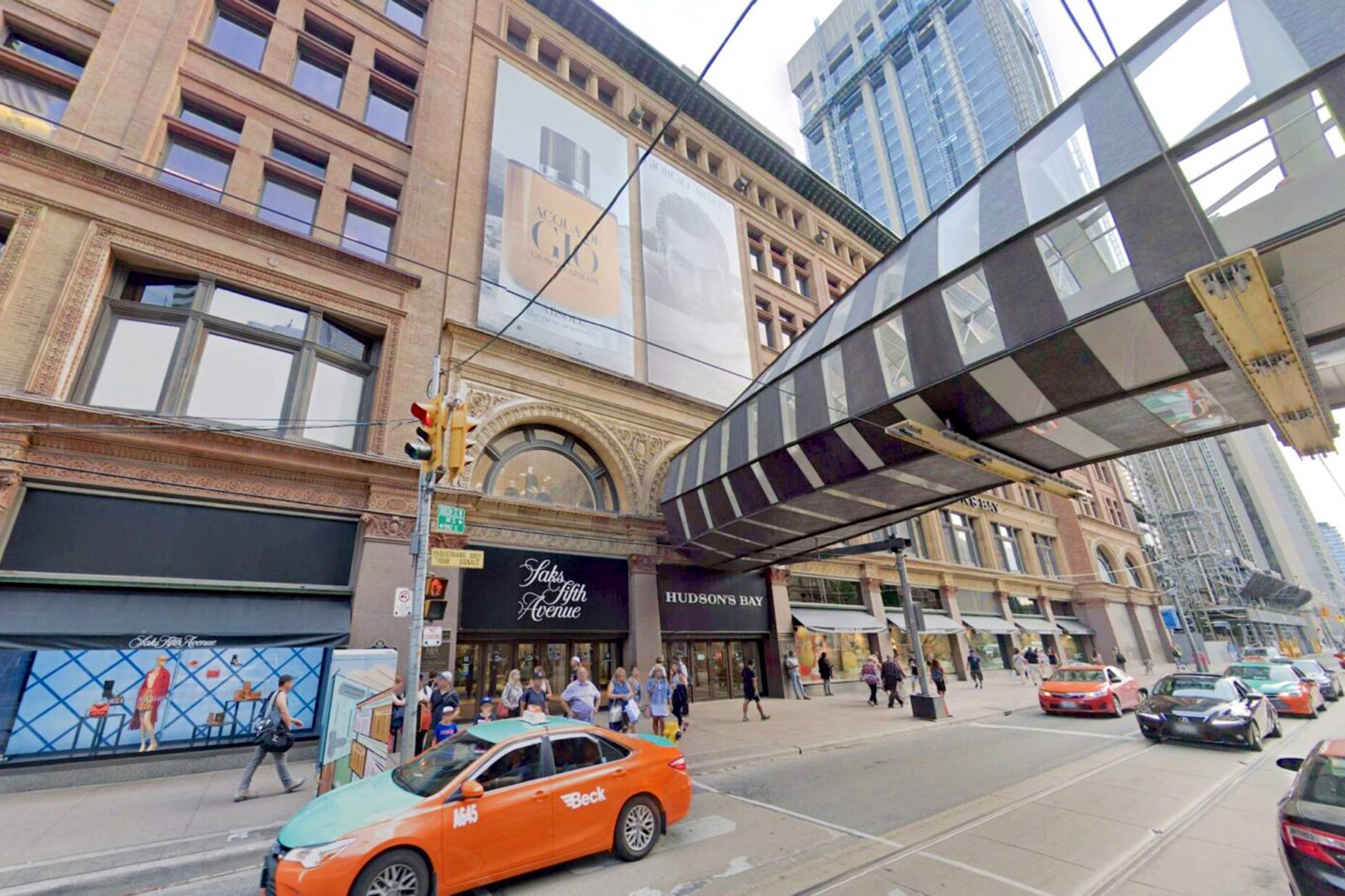
Over a dozen interested parties eyeing leases of 65 Hudson's Bay store locations
As the Hudson's Bay Company era nears its end, many of its soon-to-be vacated spaces may find new life with different tenants, with decisions on many sites expected in the weeks ahead.
By Summer 2025, all 96 of the company's brick-and-mortar stores will close following a liquidation process that first began last month — including six locations that had previously been spared, such as the downtown Toronto and downtown Montreal flagship stores, but are now slated for closure as of a new court filing this week.
From the outset of the court-approved liquidation process last month, Hudson's Bay engaged commercial real estate firm Oberfield Snowcap to market and sell its leases and properties, as a measure to generate additional operating revenue. This has been aptly named as the "Lease Monetization Process."
Final bids for leases due on May 1
According to a court filing earlier this week, as a part of the ongoing federal Companies' Creditors Arrangement Act (CCAA) process, Oberfield reached out to about 60 potentially interested entities on March 24 about the forthcoming bidding processes for the leases.
Subsequently, 31 interested entities signed non-disclosure agreements and were provided with information about the properties available for lease.
As of the first phase bid deadline on April 15, 18 entities had submitted a non-binding letter of interest — including certain landlords — expressing interest in a total of 65 individual property leases held by Hudson's Bay.
The filing did not provide a breakdown of these properties nor did it identify the parties, but it is noted that there was an overlap of locations across multiple letters.
Oberfield did not receive any letters for 36 leases.
Altogether, Hudson's Bay currently has 80 department stores, three Saks Fifth Avenue stores, and 13 Saks OFF 5th outlet stores across the country under various ownership and/or long-term lease arrangements.
These properties represent millions of square feet of commercial retail space — anchor tenant space in major shopping centres, and major buildings, including heritage structures, within Canada's major city centres.
However, it is likely that new tenants would need to make major reinvestments into many of these locations following many years of deferred maintenance practices by Hudson's Bay, such as the downtown Vancouver flagship store, where there are currently zero working elevators and escalators.
Oberfield and other advisors will screen 18 entities to determine whether they are qualified bidders, before inviting them to participate in the second phase of the bidding process.
Under the second phase, those deemed to be qualified bidders have until May 1 to submit a binding lease bid, including a deposit payment equal to 10 per cent of the purchase price.
Successful bidders are then required to complete all agreements by no later than May 15, and this is subject to final approval by landlords and the court, which is expected by June 17.
"Accordingly, the timeline is short," emphasizes the court filing.
At least one entity has publicly expressed interest in taking up a significant number of leases.
In late March, B.C. billionaire Weihong Liu reportedly announced on a Chinese social media platform that she intends to buy dozens of Hudson's Bay stores. She shared that she has been touring flagship store locations across the country, with a desire to help revitalize Canada's retail industry and support jobs.
Liu owns Nanaimo-based Central Walk, which has a portfolio of major shopping mall properties that include Tsawwassen Mills in Delta, Mayfair Shopping Centre in Victoria, and Woodgrove Centre in Nanaimo, which her company recently listed for sale. Central Walk also owns Arbutus Ridge Golf Club in Cobble Hill.
All of these properties were acquired by her company within the last few years, including for the potential for major improvements and high-density, mixed-use redevelopments.
Bidding for thousands of art and artifacts, including the Royal Charter of 1670
Beyond store leases, Hudson's Bay is liquidating a substantial trove of historical art and artifacts that reflect Canada's early heritage through a bidding process.
The 354-year-old company possesses a collection of over 1,700 pieces of art and 2,700 artifacts, according to the court filing.
This includes the English Royal Charter of 1670, issued by King Charles II, that incorporated the Hudson's Bay Company as a fur trading giant in the Rupert's Land, an area now known as Alberta, Saskatchewan, Manitoba, Ontario, Quebec, and Nunavut. The founding charter is considered a document of profound national importance.
In 2020, the charter was on display to the public for the very first time at the Manitoba Museum in Winnipeg.
The court filing states the bidding process for the collection of art and artifacts "has attracted significant interest from various parties, including government and quasigovernmental institutions, museums, universities, and high net worth individuals acting on their own accord or as potential benefactors to Canadian museums and institutions."
"Several government organizations have contacted the Financial Advisor, the Company, and/or the Monitor to express an interest in ensuring transparency in the sale of the Art Collection, and compliance with Canadian laws and regulations on heritage and culture," continues the filing.
Similarly, qualified bidders for the collection have until April 30 to submit their bid for the individual pieces of art and artifacts.
After beginning liquidation sales at nearly all of the stores in late March, Hudson's Bay recorded a positive net cash flow variance of about $30 million for the latest reporting period from March 15 to April 18. The closing cash balance as of April 18 was about $122.5 million — far higher than the previously projected cash balance of $71.5 million.
Currently, according to Hudson's Bay and Alvarez & Marsal, which is the third-party monitor appointed by the court to oversee the CCAA process, the company is forecast to have a $124.6 million closing cash balance at the end of the 13-week period on July 18.
Nearly all store locations that began liquidation sales in late March are expected to close by the end of June, while the remaining six stores could potentially close later in the summer, with liquidation sales beginning on April 25.
Google Street View
Latest Videos
Latest Videos
Join the conversation Load comments







